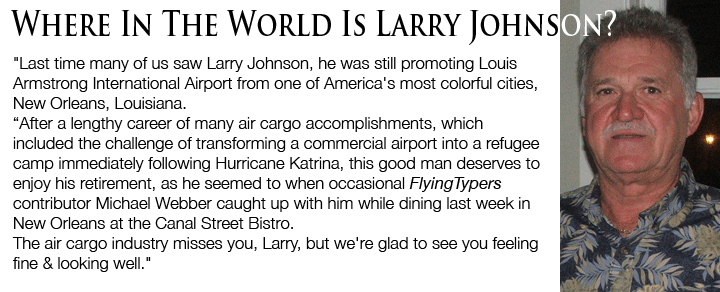Very
rarely in today’s fast-paced world do we get the opportunity to
sit down and go deep-dish with a team of players at one of the world’s
fastest growing and most admired air cargo operations.
But in the third installment in our exclusive
Flying Typers’ Reveals series, which began with Emirates’
Ed
Chism and continued with Bill
Boesch, we get up close and personal with the wheel house of Dnata
Cargo in Dubai to discover first hand the where and why of air cargo
ground handling.
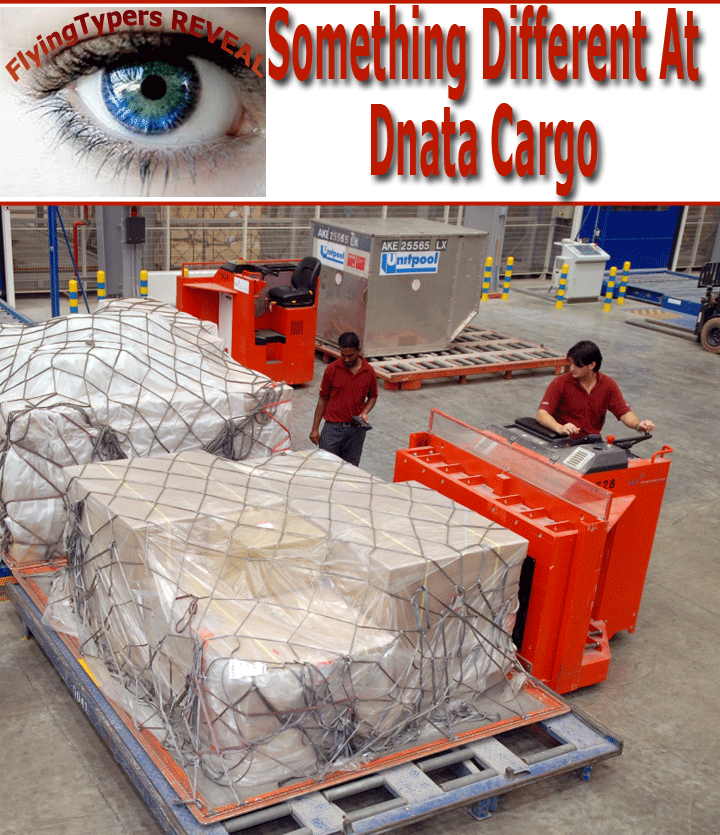
We’re meeting with Stuart Hayman,
Vice-President of Dnata's Cargo Operations; Ramesh Viraraghavan, Manager
Planning & Development; and Kevin Ennis, Vice President at Dnata
Cargo & Vice President at Emirates Group.
This is no ordinary encounter.
Here we go behind the scenes to get a
rundown of past and present operations at Dubai cargo and hear how the
group is effectively moving forward.
What emerges is a trio of air transportation
executives that are smart, dedicated, and have their assignments well
in hand.
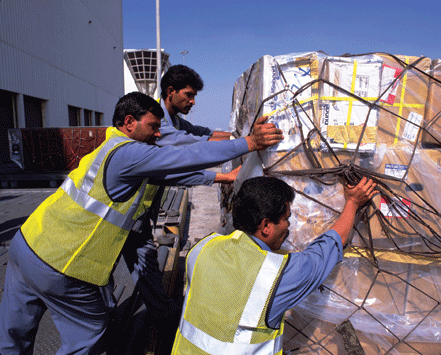 All
three gentlemen confirm that the largest factor that influenced business
last year in 2011 was global and local politics, which include fluctuation
fuel prices, the debt crisis, and the Arab spring. All
three gentlemen confirm that the largest factor that influenced business
last year in 2011 was global and local politics, which include fluctuation
fuel prices, the debt crisis, and the Arab spring.
“The year has been an eventful one
with respect to the past political upheavals in the Middle East resulting
in the Arab spring, on-going military conflict in Afghanistan and continued
impact of that devastating earthquake in Japan and last of all, the
Euro zone crisis,” said Ramesh.
Kevin interjects, “It’s been
dramatic and traumatic for the air cargo industry: political upheaval
across North Africa and some parts of the Middle East; fuel prices swinging
like a pendulum and personal debt crisis now growing into government
debt crisis (especially in Europe).
“We in Dubai have not been immune
to the effects of these events, however, the UAE and Dubai have managed
to maintain their forward march, albeit at a slower pace.”
Stuart adds, “What made 2011 so
interesting and exciting for us was the re-branding that we went through
as part of the larger dnata organization.
“The re-branding has been much more
than a new logo—it is part of a deliberate strategy to recognize
that dnata is now a truly global business that must act as such in order
to increase synergies and collaboration across our like businesses around
the network.
“For us in the Cargo Division in
Dubai, it has meant that we have a renewed focus on further improving
our customer centric service delivery."
“Headline news in dnata during the
year was the new brand launch comprising of an international roll out
of its mission, vision and values.
“The acquisitions of related businesses
around the world catapulted dnata into the 4th largest air services
provider in the world.
“For the cargo division, 2011 saw
record volumes handled in one of our latest terminal (FreightGate 8)
at the Dubai World Central (DWC) airport; significant improvement in
service levels; the launch of programs to reduce paper consumption;
trials of an alternative fuel for our mobile equipment in an effort
to reduce carbon footprint, and the commencement of a key IT project
to improve decision making and forge improvements, called the Decision
Support System (DSS),” said Ramesh.
Kevin described the brand launch as “the
pinnacle of the year”, adding that the new branding has allowed
dnata to “focus single-mindedly on the tasks ahead” on a
global level with all employees. He also confirms that the largest success
in 2011 was the “record breaking tonnages and flights” at
FreightGate 8, but that it continues to be a work in progress, with
focused efforts to enroll more carriers at DWC and continue roll out
of the Calogi cargo web portal to the international market.
Looking ahead at the remainder of 2012,
all three gentlemen agree that the largest hurdle is the ongoing Eurozone
slowdown, with no easy answers on how best to combat the difficult situation.
“As is always the case in this rapidly
changing industry, there are so many external economic variables (that
drive the success or otherwise of our business) that could go either
way.
The IMF has warned that no one is really
safe from the Euro zone crisis. The famed economist Nouriel Roubini
(popularly known as ‘Dr. Doom’) has predicted that without
any major policy change, the fall out from the crisis could last at
least a decade.
“Personally, I would expect the
rest of 2012 will serve to test various business models and result in
significant change in the way it is managed.
“Focus will be on cost and retention
of skill sets within the organization. It is a time for introspection
and a look at areas for improvement to ensure that we keep our heads
above water,” said Ramesh.
“We still really do not know the
exact extent of the crisis in the Euro zone; America still continues
to battle against its own economic crisis and the other economic power
houses, China and India are experiencing a slowdown. Cost cutting will
be the order of the day to combat practically nil growth and for our
industry that will mean customers will order less or push for more sea
freight, which will both equate to less airfreight,” said Kevin.
With these limitations and struggles in
mind, dnata Cargo’s intent is to spend 2012 “focusing on
facility improvements” in order to prepare for future consolidations.
While dnata does not expect much growth at Dubai International, Stuart
confirms that there is further growth expected at DWC-Al Maktoum International.
The key word for dnata seems to be ‘consolidation,’
at least in terms of preparations for the tough economic climate and
looking ahead.
“The need for additional capacity
at DXB will see authorities planning to create alternate facilities.
This poses both a challenge and opportunity for dnata in that it can
consolidate operations in its current, fully owned facility with both
product and layout enhancements.
“Plans are also afoot to create
capacity at the DWC facility to prepare for the eventual move of carriers
there. Processes will have to be remapped, staff redeployed, authorities
located and customers managed to ensure minimum impact,” said
Ramesh.
“We will focus on consolidating
the cargo terminal activity, which will give us a huge benefit in productivity
and staff resourcing. We will also be focusing on our new vision, mission,
values, and the development of new products to extend our product portfolio,
some of which is based on feedback we have from our customers,”
said Kevin.
Dnata's Edge
dnata Cargo attributes its current success
to an ability to “understand its customers and provide them with
a consistently positive experience that encourages them to keep coming
back” said Stuart.
“We have a wide range of customers
and we are able to tailor our service offering accordingly through our
network of advanced cargo terminals that cater to general and specialized
cargo. The continued attraction to Dubai as a logistics hub versus neighboring
regional airports is a result of the high-quality product that is also
commercially attractive to airlines,” Stuart adds.
Kevin is quick to point out that “over
50 years in the business” is helpful in propelling dnata to the
forefront, a lengthy span of time which has allowed the carrier to develop
and improve many services like dock booking and e-freight via Calogi.
“dnata Cargo in many respects has
been the pioneer of best practices in terminal handling in the region
and the world,” said Ramesh.
“It was one of the first to embrace
the concept of Total Quality and introduced active employee participation.
It won the certification for all management systems—Quality, Environment,
and safety.
“dnata Cargo was also instrumental
in setting up a comprehensive IT system for handling, which even today
is unique in many ways.
“The lean management structure with
emphasis on transparency, standardization, customer and employee focus,
innovative strategies like the launch of Cargo Web portal Calogi, and
upcoming Decision Support Systems help in building competitive advantage.
“In spite of enjoying the sole handling
status, dnata has not rested on its laurels, but has moved ahead with
improvement programs,” said Ramesh.
Despite the current economic crisis, dnata
assures that the Eurozone has been an “important market for Dubai.”
Other regions with “good potential” include “the Indian
sub-continent, China, Africa, and some parts of the Middle East,”
according to Ramesh.
“Growth in the year is also dependent
largely on the heavy cargo movements from Afghanistan and efforts are
focused on serving these customers better and ensuring goods flowing
through the terminal are smooth,” said Ramesh.
“India, China and Africa are really
developing well along with the project cargo movement, which is going
in to Iraq and Afghanistan.
“Dubai, placed at the crossroads
of international trade, will always benefit from a strategic location.
Fortunately we have a diverse airline
base using our services (over 120) and the market ups and downs somehow
level off—as one market goes down the other shows signs of revival—so
increasing this large customer base to insulate us from regional issues
will always hold us in good stead,” confirmed Kevin.
For dnata, the individuals that deserve
perhaps the most admiration are “the teams of our people who work
tirelessly every day to achieve our new mission; to deliver the promises
that our customers make,” said Stuart.
“To me, they are the unsung heroes
who often have to work in extreme weather conditions here to ensure
that the cargo keeps moving and gets to its intended destination on
time.
“They are always up for a new challenge
and they are genuinely proud to be a part of the success story that
is Dubai whilst also providing for their families, many of whom are
back in their home-country,” said Stuart.
“At dnata, the entire management
layer works as a team and in a cohesive manner. Neatly tying this up
is Jean Pierre De Pauw, DSVP, dnata Cargo, whom I think is a great strategist,
visionary, and has an excellent eye for detail.
“JD is a good example that being
objective, hardworking, and truthful really pays off. I also admire
the front line staff that tirelessly works to ensure that the customer’s
requirements are met, especially in peak summer when the conditions
on the floor can be difficult,” said Ramesh.
“The senior Management in dnata
have always given us the direction as well the freedom to deploy our
ideas in the business, and finally, I hold great admiration for our
staff who are really the stars working tirelessly 365 days a years in
weather that can really intimidate the faint hearted,” confirmed
Kevin.
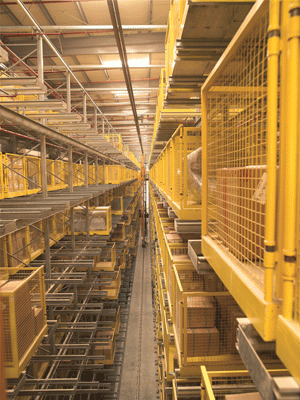 All
three men hold different tenures at dnata Cargo and so perspectives,
while adherent to similar ideals, do vary based on when each position
was assumed. Stuart considers himself a “relative newbie”
having started at dnata only 5 years ago. His vantage point began with
“a lot of change and expansion, starting with the opening of our
highly automated premium cargo terminal, FreightGate-5 (FG5), in the
Dubai Airport Free Zone. All
three men hold different tenures at dnata Cargo and so perspectives,
while adherent to similar ideals, do vary based on when each position
was assumed. Stuart considers himself a “relative newbie”
having started at dnata only 5 years ago. His vantage point began with
“a lot of change and expansion, starting with the opening of our
highly automated premium cargo terminal, FreightGate-5 (FG5), in the
Dubai Airport Free Zone.
“Whilst still a part of Dubai International
Airport, the opening of FG5 represented quite a shift of air cargo volume
away from its traditional home on the south side of the airport in ‘Cargo
Village.’ “During that period, we have also seen dnata Cargo
take over the operation of the purpose-built perishables facility known
as Dubai Flower Centre, which we refer to as FreightGate-6.
“Volumes have continued to grow
fairly steadily over this period as well, with exception to the GFC-induced
volume decline in 2009 and more recently in 2011.
“We have also grown in to a whole
new airport and cargo terminal down at DWC-Al Maktoum International,
which is no mean feat!” exclaimed Stuart.
Ramesh joined dnata in 2001/02 and watched
it grow “from a single terminal to a multi terminal company,”
which today “manages 7 large terminals serving the needs of air
cargo community in Dubai” and “has grown from a company
of 400-plus staff to 1,700 staff.”
Kevin holds the most years, joining dnata
in 1994, “when dnata was a single terminal in the Dubai Cargo
Village.” His perspective is perhaps the vastest, as he has seen
Dubai cargo grow “from around 350,000 tonnes to over 2.2 million
tonnes a year,” with “2 airports in Dubai and at 16 airports
in 7 countries overseas.”
One of the most talked about areas of
growth for Dubai has been the DWC-Al Maktoum International Airport,
which has been in operation for approximately 18 months. While the airport
started off slowly in 2010, it has seen much growth in flights and tonnage
over the last 8 months of 2011.
“We had a record month in October
2011, when we handled 11,773 tonnes of cargo, and we look set to break
that record for the month of January 2012.
“We have a mixture of both project
cargo and commercial cargo with the mix currently at about 70 percent
for project cargo and 30 percent for commercial. The project cargo that
we are handling is a fantastic example of exploiting the true multi-modal
capabilities of the new airport.
“With its proximity to the busy
Jebel Ali Port, the project cargo arrives by sea, is transported under
bond directly from the port to the airport and is then built up for
dispatch on flights departing from DWC. The same is true for the reverse
with cargo arriving on airplanes and swiftly transiting through to the
port for the last leg of its journey by sea,” said Stuart.
He confirmed that congestion at Dubai
International Airport due to increased passenger business has inhibited
further growth for cargo business there; however, “DWC has plenty
of room for cargo growth.”
“In the first phase, we are operating
a cargo terminal with annual throughput capacity of 250,000 tons. This
can be increased to 600,000 tonnes with the addition of materials handling
automation and an additional open yard to cater for the varied outsized
cargo that freighter aircraft typically carry.
“dnata is excited and optimistic
about the growth prospects in the unconstrained airport environment
at DWC-Al Maktoum International Airport,” said Stuart.
Ramesh called DWC “a blessing in
disguise” in that ”its deft handling of project cargo volumes
has significantly shored up volumes.”
Kevin confirmed that DWC has done “over
120,000 tonnes of airfreight over the year, which is an extremely good
start.”
“We have handled over 2,500 freighter
flights over the same period. The customs bonded corridor, which links
the sea port with the airport, has proven to be a boon for the forwarders,
as they can now move their ‘sea-air’ shipments without have
to put up any bonds or guarantees.
“We mainly handle project cargo,
sea–air, and commercial cargo for the big forwarding agents based
either in Dubai Logistics City or Jebel Ali Freezone,” said Kevin.
dnata remains confident in the power of
Dubai as a central hub and places a lot of importance on logistics as
a key factor of its success.
“The Government of Dubai have long recognized
the economic importance of logistics and the strategic location of Dubai
as a logistics hub.
“The logistics sector is one of
the key pillars in the master plan for Dubai’s continuing growth.
The Government has already, and continues, to invest in providing world-class
infrastructure to support this growth,” said Stuart.
“Dubai lays a great deal of emphasis
on IT and education, and hence I am confident that as long as these
are effectively managed and continued, the emirate will continue to
outshine others in the race,” confirmed Ramesh.
“There is a huge focus on the logistic
side of the industry and the government is investing heavily in the
area to make sure Dubai retains its preeminent position as the hub of
the Middle East,” said Kevin.
Air cargo remains a mercurial, growing
industry that demands people who can essentially “keep the pace,”
a requirement known by many in the business. Propelled by technological
advances and an expansive global landscape, cargo is fast becoming a
business of the old welcoming the young, as youth is essential to the
ebb and flow of innovation and nothing in air cargo stays the same for
very long. Thankfully, the task of engaging new blood has not been a
difficult one.
“I think cargo is a very exciting
business. We know we aren’t as glamorous as the passenger side
of the aviation business but we still have a lot to offer in terms of
career development and choice and it seems that there is a never a dull
day in this business with some sort of external shock requiring a response,”
said Stuart.
“Air cargo is an integral part of
the broader logistics and supply chain management sector. This is a
sector and function that is now considered to be pivotal in nearly all
of today’s businesses.
“As consumers, we have grown more
and more demanding (and impatient!) and that’s where air cargo
fits the bill in terms of satisfying our desire for rapid fulfillment
of products, particularly also with the huge growth of online shopping.
“Many large companies have spent
several lean years trying to squeeze costs out of their businesses.
They now recognize that improving the
efficiency of their supply chains is a method of not only reducing costs
but also providing a competitive advantage.
“There are also plenty of articles
that often talk about the shortage of talent with respect to logistics
and supply chain professionals, so there are lots of opportunities for
career growth in this business,” said Stuart.
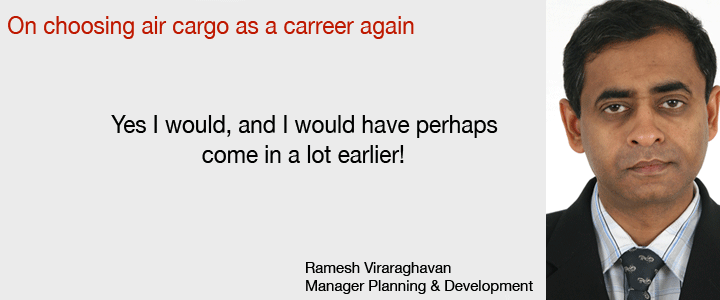 |
“The logistics industry is a growing
one and is the lifeline for movement of goods and services across the
world. With established concepts like just in time, time to market the
industry is required to change rapidly to keep pace.
“However, in many areas technology
has really not caught up as you see a lot of paperwork being standard
practice in cargo activities around the world. This then is the challenge
for cargo with processes being more agile, secure, and time bound. The
cargo industry offers a number of opportunities from land, sea and air
type of movements and with various regulatory bodies,” said Ramesh.
He sees the future of the industry involving more integration with IT
technology and automation in order to gain market advantage and grow
service levels.
“I think with globalization, the
need for people and cargo to move is becoming more important by the
day.
“Being based on the cargo side of
the industry, as well as representing dnata on the Board of two freight
forwarding companies and a Road Feeder Service trucking company, I have
a helicopter view of the freight and logistics industry.
“Just in Dubai alone the freight
& logistics side contribute greatly to Dubai’s economy and
will continue to do so in the future as well. Internationally, the need
to move goods across the globe is increasing by the minute with new
economies raring to go and with the customs barriers falling, making
it easier to import or export goods to emerging as well as established
markets,” said Kevin. He also sees more automation coming down
the pike, which will “help companies cut costs. Inventory controls
will be better managed as companies try and order/replenish JIT instead
of sitting on slow moving stock.
“Outsourcing of work wherever possible
to be able to cut back quickly in case of market deviations and security
will take more precedence going forward,” said Kevin.
An Appreciation Of Life
But life cannot all be air cargo, no matter
how engaging, interesting, or demanding it may be. How can we appreciate
it unless we step away from it for a while?
“Relaxation time for my wife and
I is usually all about the kids, although I do try and squeeze in the
odd round of golf whenever possible! We like to go to the movies as
a family and the last movie we saw together was the fabulous Hugo, which
was particularly enjoyable given that we had just returned from a quick
pre-Christmas trip to Paris,” said Stuart.
“We do also enjoy travelling and
are making the most of the strategic location of Dubai to hop around
to places that would otherwise be too far away if we were living back
home in Australia. Recent vacation destinations over the past few years
include Paris, Zurich, London, Prague, Beijing, Phuket, The Maldives,
Sri Lanka, Los Angeles, New York, and the obligatory annual trip back
home to Sydney.
“Work-wise, I’ve been working
(all in the air cargo industry) for a total of 24 years and I’d
like to think that I have at least another 24 (or more!) years in me.
I think I’m perhaps still a little young to be ready to leave
a legacy! I completed my Higher School Certificate at a great boarding
school in Sydney where I studied all the usual subjects plus a bit of
economics.
“I started working at Qantas within
a few months of finishing secondary school and proceeded to study part-time
for a Bachelor of Business Degree in Sydney, with a double major in
marketing and management. Having such
a passion for the industry (or being a sucker for punishment!), I did
an MBA in Logistics and Supply Chain Management here in Dubai from 2008-2010
through Emirates Aviation College/Coventry University. If I wasn’t
here in my current role, I would be somewhere in the world in the air
cargo industry!” exclaimed Stuart.
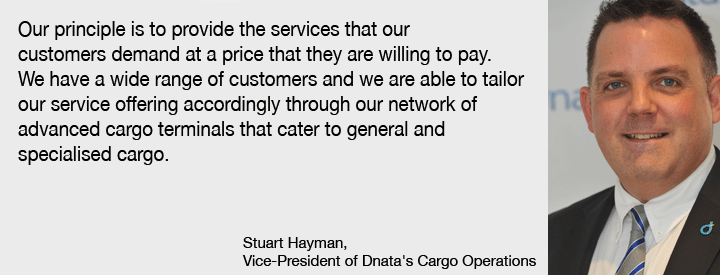 |
Ramesh chimes in, “As a DIY person,
I love to fix things around the house on weekends and my favorite thing
to buy is some more accessories for my already well-equipped tool box.
If I am not hammering away at things, I am usually among my plants,
which provide greenery and color to my apartment balcony. Apart from
this, I am an ardent family man, happy to go to the mall, wait around
while the women in my life do their shopping, and then meet friends
over dinner.
“One book I couldn’t put down
was the biography of Steve Jobs, what made him a titan in technology
was a fascinating read. Though my preference for vacation is to relax
in a tranquil setting surrounded by greenery on one side and the beach
on the other, I have never managed to do so. The mandatory trip back
home to visit parents and family has left little time for my dream vacation.
I intend to put in several more years of service before branching off
to set up something of my own. It has been on my mind but the timing
has to be right for the plan to succeed and I think that time has not
come yet.
“I have a passion for quality and
industrial engineering work and I started my career teaching the subject
at a local college in India. Subsequently I worked for 12 years as a
Quality Engineer, then Quality Assurance Manager, Gear plant of a leading
automobile company in India. I then moved to Oman to join a petroleum
company as a Quality and Product development Engineer.
“The attraction of implementing
quality systems in dnata Airport operations drew me to Dubai and then
the challenge of working in cargo to my current post as Planning and
Development Manager.
“The principles of quality and IE
techniques can be deployed in any industry and these are universal approaches
to manage business and productivity. These tools were developed in the
engineering industries and its application to a service-orientated industry
is interesting and rewarding.
“I have been in cargo for the last
10 years and I must say there are a lot of companies in the cargo community
who would need these to be applied to effectively manage costs and processes
within their units. I hold a degree in Industrial Engineering and Masters
in Quality, Instrumentation and Business Administration.”
Kevin says, “to relax I usually watch
TV—mainly the Sports, History, National Geographic, and Animal
Planet channels, in that order. I also run a couple of miles every morning
at around 5.00 a.m., which keeps me going for the rest of the day.
“I will normally go back to India
for my vacations; being such a vast country with forest, deserts, plains,
and some of the highest mountain peaks in the worlds, we have a great
choice of destinations. Additionally, both of my children now reside
permanently in India, which is an added incentive to go back. God willing,
I intend to work for another 10 years.
“As a legacy, I am currently Vice
president of the National Association of Freight & Logistics and
I intend setting up the internationally recognized freight forwarding
training program for the industry. Dubai is the cargo hub of the Middle
East but the community still lacks a place where new joiners to the
industry or even some of the old timers can get themselves trained or
retrained in all the new regulations or mandatory training in the industry.
“I am a fully qualified marine Engineer,
if it were not for a personal reason I would have been sailing today,”
confides Kevin.
Critical Influences
When it comes to positive influences,
all three dnata men list their parents as first, but there are, of course,
also cargo greats thrown in the mix.
“My parents gave me a solid moral
and ethical grounding, a great education and a taste for expatriate
life!” exclaimed Stuart.
“During my 18 years at Qantas, James
Strong had an influence over the way in which I viewed the importance
of people in our businesses. He was also a master at de-mystifying much
of the ‘management-speak’ jargon and truly leading by example.
“Although I’ve never met him,
Jack Welch’s management style (by reading several of his books)
has also resonated with me and has been an influence on my business
life, particularly his focus too on the people side of a successful
business and the way in which he used to manage not only the high performers
but also the under-performers,” said Stuart.
“My father played an influential
role, stressing the need to be straightforward, truthful, and having
a purpose in life. Integrity was very important to him and these have
helped shape my thinking as well.
“Workwise, I have been fortunate
to have been associated with bosses who were always pushing the boundaries
to achieve and to do things better.
“Both the Managing Director of my
earlier company, Mr. Venu Srinivasan, and the General Manager, Mr. Chakrapani,
were sources of inspiration to me. The organization was a true learning
one where emphasis was given on education and best practices.
“Award winning practitioners of
quality, policy deployment, new product development, statistical analysis,
or process analysis were frequently brought in from various locations
around the globe to share tools and practices. Many were from Japan
and the UK.
“In my current role JD, as mentioned
earlier, has been source of inspiration. Practicality and theory are
blended effectively to improve processes and systems enabling many firsts
to be achieved,” said Ramesh.
Kevin says, “My dad gave me the
best education available and was my mentor; I owe all my values to him.
“Ralph Lazarus, my General Manager
at FORVOL (Forbes Volkart), who put me through my paces as a young trainee
in a freight forwarding division, is another inspiration.
“He guided me in my 12 years at
FORVOL from a Trainee to finally becoming the All India Manager running
the HQ and 12 branches strung out all over the country.
“And of course, Jean Pierre DePauw
– who molded me from a hard core freight forwarder into the Vice
President Commercial of dnata Cargo (A Ground handling company),”
said Kevin.
When questioned whether any of our 3 dnata
fellows would “do it all over again” with a career in air
cargo, we were met with a resounding “Yes!” in triplicate.
Geoffrey/Flossie |




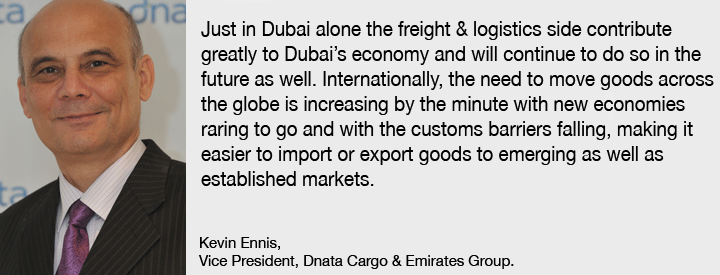
 All
three men hold different tenures at dnata Cargo and so perspectives,
while adherent to similar ideals, do vary based on when each position
was assumed. Stuart considers himself a “relative newbie”
having started at dnata only 5 years ago. His vantage point began with
“a lot of change and expansion, starting with the opening of our
highly automated premium cargo terminal, FreightGate-5 (FG5), in the
Dubai Airport Free Zone.
All
three men hold different tenures at dnata Cargo and so perspectives,
while adherent to similar ideals, do vary based on when each position
was assumed. Stuart considers himself a “relative newbie”
having started at dnata only 5 years ago. His vantage point began with
“a lot of change and expansion, starting with the opening of our
highly automated premium cargo terminal, FreightGate-5 (FG5), in the
Dubai Airport Free Zone. 

